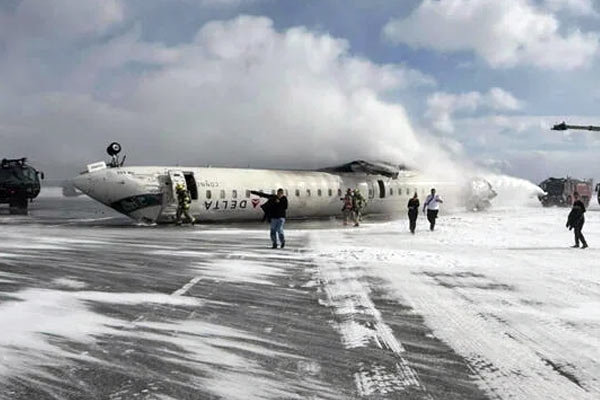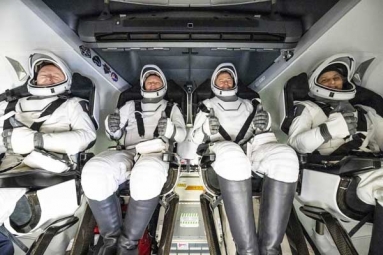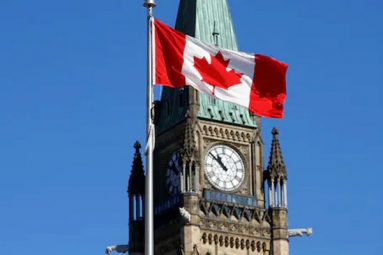
(Image source from: News9.com)
On Monday, a regional jet operated by Delta Air Lines flipped over upon landing at Toronto Pearson Airport in Canada, amid strong winds that followed a recent snowstorm. This incident resulted in injuries to 18 out of the 80 individuals aboard, according to officials. Among the injured, three passengers, including a child, were reported to have sustained severe injuries. Delta confirmed that the aircraft in question was a CRJ900, managed by its Endeavor Air subsidiary, which was involved in an incident classified as a single-aircraft accident, carrying 76 passengers and four crew members. The 16-year-old CRJ900, manufactured by Bombardier in Canada and equipped with engines from GE Aerospace, is designed to accommodate up to 90 passengers. Investigations into the cause of the mishap are being conducted by Canadian authorities, but the exact reason has not yet been determined.
A passenger named John Nelson shared footage of the scene on Facebook, depicting a fire truck spraying water on the aircraft that had landed upside down on the snow-covered grounds. He later recounted to CNN that nothing seemed amiss prior to landing. "We touched down, then we were sideways, and suddenly we were inverted," he explained to the network. "I managed to unbuckle, fall, and push myself to the ground. Some individuals were hanging and required assistance to get down, while others managed to exit independently," he added.
Earlier that day, Pearson Airport was coping with harsh winds and freezing conditions, as airlines worked to accommodate delayed flights following a weekend snowstorm that deposited over 22 cm (8.6 inches) of snow. The Delta flight arrived in Toronto at 2:13 p.m. (1913 GMT) after an 86-minute journey and came to a stop at the intersection of runway 23 and runway 15, as noted by the flight tracking service FlightRadar24.
An emergency responder communicated with air traffic control, stating, "The aircraft is inverted and on fire," after controllers observed some passengers walking around the wrecked plane, as per a recording shared on liveatc.net. Deborah Flint, the president of the Toronto airport, credited the absence of fatalities partly to the prompt actions of the first responders at the site. "We are extremely thankful that there has been no loss of life and that the injuries were relatively minor," she remarked during a press briefing. Michael J. McCormick, who is an associate professor specializing in air traffic management at Embry-Riddle Aeronautical University, pointed out that the aircraft's upside-down position made this accident rather distinctive. "However, the survival of 80 individuals in such a scenario is a testament to engineering excellence, technological advancements, and the regulatory frameworks in place that enable people to survive situations that would have been fatal in the past," he commented.
Delta released a statement indicating that all 18 individuals who were hurt were passengers, and they were subsequently taken to nearby hospitals. Among those injured, two required airlifting to trauma centers, and a child was sent to a pediatric hospital, according to Supervisor Lawrence Saindon from Peel Regional Paramedic Services. Toronto's airport was closed for over two hours, halting both departures and arrivals before operations resumed. This situation resulted in delays on the ground and the redirection of flights to other destinations, such as Montreal-Trudeau International Airport, which noted its readiness to accept several diverted flights that could lead to additional delays. On Monday evening, Flint mentioned that there would be operational disruptions and delays at the Toronto airport for the upcoming days since two runways would remain closed while investigations were carried out.
The Transportation Safety Board of Canada (TSB) announced that a team of investigators was being sent to the scene, and the U.S. National Transportation Safety Board indicated it would provide support to Canada's TSB. Mitsubishi Heavy Industries of Japan, which acquired the CRJ aircraft program from Bombardier in 2020, acknowledged awareness of the incident and pledged full cooperation with the ongoing investigation. This accident in Canada follows several recent incidents across North America, including a crash involving an Army helicopter and a CRJ-700 passenger jet in Washington that resulted in 67 fatalities, a medical transport plane crash in Philadelphia that killed at least seven people, and a passenger plane crash in Alaska that took the lives of ten individuals.










